| |
 |
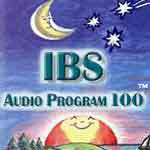
Gut-directed hypnosis is one of the most effective ways to help relieve all IBS symptoms! Results can last more than 5 years.

In this Issue...
Food & Recipes
Rx News & Research
Ask Heather
About Us

Organic Acacia
Soluble Fiber
The prebiotic fiber that reduces bloating & gas!

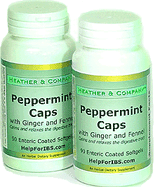
Try Peppermint Caps
Peppermint Caps are the best for abdominal spasms, cramps and pain!

Get the IBS Diet Kit!
With Eating for IBS, plus organic fennel tea for bloating and gas, plus peppermint caps to prevent spasms and pain.
Take control of your IBS!

Get stable now ~
and stay that way!
Did you miss the latest
IBS newsletter and
Oatmeal Molasses
Cookies?

Past issues
are posted here!
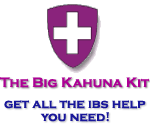
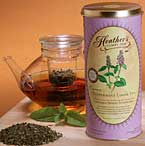
Try Heather's
Peppermint Tummy Tea
Peppermint is a smooth muscle relaxant and has pain-killing properties. Our tea is large leaf with a high volatile oil content - much stronger than tea bags!

The IBS Starter Kit!
Learn every way possible to successfully manage your symptoms!
With the First Year: IBS, an essential guide, plus Eating for IBS, plus Acacia Tummy Fiber to start stabilizing immediately!
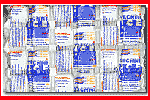
Heat Therapy for
IBS
Hot packs can help prevent stress-related attacks!

Fennel Tummy Tea for
IBS Bloating & Gas
Fennel has anti-spasmodic properties and it stimulates the production of gastric juices. It's extremely useful for gastrointestinal and menstrual cramps, colic, heartburn, indigestion, and stomachaches. Fennel tea is the best for relieving bloating and gas!
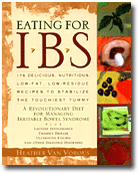
Delicious Recipes
for IBS!
Learn how to eat well and feel better
|
 |
|
| |

IF YOUR NEWSLETTER IS HARD TO READ OR IF THE LINKS DON'T WORK,
Please copy and paste this address into your browser window:
http://www.helpforibs.com/news/newsletter/banpanc031004.html
March 10, 2004
This week ~ Hypnosis as Therapy for IBS
Hello to everyone -
This week we have a wealth of digestive health news stories, we're nearing the end of our Seven Sneaky Sins of the IBS Diet, and we're kicking things off with a delicious Banana Buckwheat Pancake recipe!
Pancakes are oh-so-deadly for IBS when made the traditional way (lots of whole milk, egg yolks, and butter). Fortunately, they're easily modified to be digestion-friendly, and the changes don't affect the flavor one bit. This particular recipe has something extra special, as it uses ripe bananas for healthy sweetness and buckwheat flour for an earthy goodness. A handful of chopped pecans in the batter lends a nutty crunchiness as well. If you don't have any buckwheat flour on hand, just substitutes yellow cornmeal instead. Your breakfast short stack will be just as delicious!
Best Wishes,
Heather Van Vorous
Note: Did a friend send you this newsletter? Sign up here for your own free subscription.


Banana Buckwheat Pancakes
Makes 3-4 Servings
2 very ripe medium bananas
1/2 cup plus 1 tablespoon all-purpose white flour
1 tablespoon baking powder
2 tablespoons brown sugar
1/4 teaspoon salt
1/3 cup buckwheat flour (or yellow cornmeal)
3/4 cup soy or rice milk
2 organic egg whites
1 tablespoon vanilla
1/4 cup finely chopped pecans (optional)
Blend all ingredients except pecans in a blender until smooth. Tranfer batter to a bowl and stir in pecans. Heat a large nonstick skillet over medium heat and spray skillet lightly with cooking oil. Drop scant 1/4 cup of batter at a time onto skillet to form pancakes, and cook until bubbles appear on surface. Flip pancakes and cook until undersides are golden brown. Serve with pure maple syrup.
For oodles of delicious recipes, come visit the IBS Recipe Exchange Message Board!
Are you just learning how to eat for IBS? A little intimidated at the thought of special IBS recipes? Don't worry! Come see
the IBS Diet pages, and find the answers to all your questions.
 Growing Case for Hypnosis as Therapy for Functional GI Disorders
Growing Case for Hypnosis as Therapy for Functional GI Disorders
The cumulative and consistent evidence for efficacy of hypnotherapy for functional GI disorders seems to warrant serious consideration of its use as a regular adjunct in primary care and gastroenterology treatment of patients with IBS.
It is becoming increasingly hard to ignore the notion that the skills of the hypnotherapist should be made routinely available to patients with functional GI disorders. The evidence consistently argues that wide availability of hypnotherapy would make management of these disorders more effective and would add broad benefits in improved emotional well-being and functional status of these patient groups. It might also produce large savings in cost of care for health care systems because of reduction in medication use and health care visits.
These potential advantages of hypnotherapy as adjunct in the management of IBS and functional dyspepsia raise the question whether it would be possible to implement routine adjunctive hypnosis management in mainstream care for GI disorders.
In light of the growing evidence of the value of hypnotherapy in enhancing care for functional GI disorders, it would seem timely to make a concerted effort to examine ways to remove barriers and facilitate the availability of such treatment; for example, by providing systematic training to health professionals specifically in hypnotherapy for functional GI disorders, integrating hypnotherapy services, and enhancing reimbursement and referral patterns for such treatment. Check here for more
information about this study...
Check here to learn about self-hypnosis for IBS
Researchers Pioneer Accessible, Cost-Effective Treatments for IBS
University at Albany researchers are pioneering more accessible, cost-effective treatment programs for two of the nation's common ailments, Post-Traumatic Stress Disorder (PTSD) and Irritable Bowel Syndrome (IBS).
Rather than relying on the common face-to-face, therapist-patient relationships, the unique treatments are self-managed, with the patient undertaking much of the therapy through reading material, structured homework, and diagnostic tools.
"It's the wave of the future," says doctoral research supervisor Edward B. Blanchard, director of the UAlbany Center for Stress and Anxiety Disorders. "The treatment is very accessible to people who have limited mobility or limited access to areas where therapists tend to locate, such as cities. It's self-managed and self-paced, and less expensive than traditional treatment. And it's done under the trained eye of a clinician, who can help assess progress."
Check here for more
information...
Health Foods May Seem Expensive, but Healthy Diets Save Money
Everyone is looking for the lose-weight quick solution. Adding to this is the fact that nutritionists are frequently changing their minds on what is good and what is bad for us. If even the experts cannot agree, how are we to make the right choices? According to Dr. David Katz, author of "The Way to Eat," the nutrition community is nearly universal in its support in a diet rich in grains, fruits and vegetables and restricted in saturated fat and processed foods. Therefore make your commitment strong and stay with it.
Most people believe that healthy food is more expensive than unhealthy food. However, when the costs of the entire diet are considered, eating well costs less than eating poorly.
According to Katz, many healthy foods can be expensive. Many specialty products are made in smaller quantities and so they can be more expensive. Organically grown produce can also be more expensive, but you get what you pay for. These fruits and vegetables tend to be more flavorful and do not include chemicals and pesticides. However, compared to meat and animal products, plant-based foods are generally less expensive.
"Each time you substitute beans, lentils or tofu for meat, the fiber and nutrient content of the diet goes up, while the fat content and cost go down," Katz said. "Whole grains are generally inexpensive as well," said Katz. "By increasing the amount of whole grain oats, rice, wheat, couscous and/or barley, you also improve your diet as well as your wallet."
Revising your diet to a healthier one can actually be cost-effective.
Check here for more
information...
Syndrome Connects Gallbladder Dysfunction & Chronic Diarrhea
A study suggests that millions of Americans believed to be afflicted with chronic diarrhea (CD) as a result of an intestinal disorder may in fact be suffering from gallbladder dysfunction. Furthermore, this research is considered by many prominent gastroenterologists to be the first recognition of a new syndrome that links CD to gallbladder dysfunction.
Referred to as the Habba Syndrome, the groundbreaking research described by Saad F. Habba, M.D., attending gastroenterologist at Atlantic Health System's Overlook Hospital in Summit, N.J., establishes a relationship between gallbladder dysfunction and chronic diarrhea. Dr. Habba observed that his patients presented CD symptoms that mimicked those found in some individuals who have had their gallbladders removed. In particular, they experienced CD only after meals and rarely at night unless they ate a heavy, late-night meal. After conducting a series of diagnostic tests and therapeutic trials, Dr. Habba was able to rule out the possibility of irritable bowel syndrome (IBS) and other intestinal disorders. Specifically, he was able to confirm his theory of CD caused by a dysfunctional gallbladder as demonstrated by specific tests indicating abnormal contractions of the gallbladder. He then prescribed low doses of cholestyramine, a cholesterol-lowering drug often used by gastroenterologists to treat CD resulting from gallbladder removal. Each patient in the study experienced almost immediate relief from their chronic diarrhea following this treatment.
"Rising accounts of CD treatment failure have led me to believe that the gallbladder dysfunction demonstrated in my study may be a widespread condition," said Dr. Habba. "Chronic diarrhea results from a variety of causes and all possibilities should be explored before making a treatment decision."
Dr. Habba's independent study helps to create a clearer distinction between CD that results from gallbladder dysfunction and a variety of intestinal abnormalities. In particular, irritable bowel syndrome (IBS) is an intestinal condition experienced by an estimated 35 million people in the U.S. and is a common cause of CD. Patients with this syndrome rarely experience the localized pain associated with IBS. In addition, these patients respond to bile acid binding agents (such as cholestyramine) rather than the antispasmodic drugs that typically control the intestinal contractions associated with IBS.
Check here for more
information...
High Fructose Corn Syrup a Culprit in the Nation's Obesity Crisis
An overweight America may be fixated on fat and obsessed with carbs, but nutritionists say the real problem is much sweeter -- we're awash in sugar. Not just any sugar, but high fructose corn syrup.
Almost all nutritionists finger high fructose corn syrup as a major culprit in the nation's obesity crisis. The inexpensive sweetener flooded the American food supply in the early 1980s, just about the time the nation's obesity rate started its unprecedented climb.
The question is why did it make us so fat. Is it simply the Big Gulp syndrome -- that we're eating too many empty calories in ever-increasing portion sizes? Or does the fructose in all that corn syrup do something more insidious -- literally short-wire our metabolism and force us to gain weight?
Loading high fructose corn syrup into increasingly larger portions of soda and processed food has packed more calories into us and more money into food processing companies, say nutritionists and food activists. But some health experts argue that the issue is bigger than mere calories. The theory goes like this: The body processes the fructose in high fructose corn syrup differently than it does old-fashioned cane or beet sugar, which in turn alters the way metabolic-regulating hormones function. It also forces the liver to kick more fat out into the bloodstream.
The end result is that our bodies are essentially tricked into wanting to eat more and at the same time, we are storing more fat.
Check here for more
information...
Stress May Lead To Food Allergies
Researchers from the University of Amsterdam have found a link between stress and food allergies, as well as other intestinal disorders. Annette van Kalkeren, a biologist from the university, found that mice that have been subjected to stress have intestines that overreact to certain foods.
Kalkeren investigated the reaction of pieces of mouse intestine to egg albumin, a substance found in eggs. Just like humans, mice can become allergic to the substance. She found that the intestines of mice subjected to prolonged stress had more symptoms of food allergies.
The intestinal wall becomes more permeable under stressful conditions. Harmful substances penetrate the intestinal wall, which causes a panic response by the immune system. That could be the start of an allergy.
During chronic stress, the body's natural defense is weakened and allergens can penetrate deep into the body. Food allergies and various intestinal diseases, such as Crohn's disease, ulcerative colitis and irritable bowel syndrome can in part be caused or enhanced by chronic stress.
Check here for more
information...
Diverticular Disease: A New Concept of Pathogenesis
The cause of diverticular disease (DD) is not exactly known, although colonic motor disorder has been proposed as a factor in the pathogenesis of the condition. We investigated the hypothesis that disordered colonic electrical activity is responsible for the colonic motor dysfunction and the development of DD. This study concluded that the similarity between early DD and the irritable bowel syndrome suggests that DD is an advanced stage of the irritable bowel syndrome; further studies are required to investigate this hypothesis further.
Check here for more
information...
Looking for the latest IBS research and news?
Check out the IBS Research Library!
 Common Pitfalls ~ The Seven Sneaky Deadly Sins of the IBS Diet
Common Pitfalls ~ The Seven Sneaky Deadly Sins of the IBS Diet
"I'm following the Eating for IBS diet, but I still have problems. What am I doing wrong?"
I hear from many people who have made a great effort to modify their diet for IBS, but who still have abdominal symptoms they feel certain are associated with their eating habits. They're often very frustrated because they believe that there aren't any steps left for them to take. The good news here is that it's much more likely than not that there are still dietary triggers involved, they're simply being overlooked.
I've found that there are seven specific pitfalls that ensnare many people as they adjust their diet - let's call them the Seven Sneaky Deadly Sins of the IBS Diet:
1. Coffee (yes, decaf counts)
2. Yogurt (it's the safest dairy product for IBS...isn't it?)
3. Alcohol (just one glass of wine is okay, right?)
4. Vitamin supplements (they're good for you, aren't they?)
5. No insoluble fiber foods (they're triggers, so you just don't eat them, right?)
6. Too low a dosage of soluble fiber supplements
7. Not drinking enough water (doesn't soda pop count?)
Sixth on the list is...
#6. I've been taking a soluble fiber tablet every day for weeks now, and I really haven't noticed any improvement. Isn't a soluble fiber supplement supposed to make a big difference for IBS?
Yes, a soluble fiber supplement should be extremely helpful for IBS. Soluble fiber is the key to preventing the abdominal spasms and bowel dysfunction of IBS, and this is just as true for supplements as it is for soluble fiber foods.
Remember, soluble fiber works by absorbing liquids in the digestive tract to form a stabilizing gel that relieves cramping and prevents both diarrhea and constipation. Clinical studies with IBS patients have repeatedly proven the benefits of soluble fiber supplements.
However - in order for soluble fiber supplements to work, you have to take a high enough dose, and many people don't. It's particularly easy to take too little of a supplement that's in tablet form, as most soluble fiber pills and capsules have only 1/2 gram of fiber. In comparison, most powder supplements contain 2-4 grams of soluble fiber per dose. Ideally, you'll gradually work up to a soluble fiber supplement dosage of 12-15 grams per day, though you may also stabilize at a lower dose.
Remember that different people have varying tolerances and adjustment periods to soluble fiber supplements; this means that it can take from several days to two weeks or longer for your body to adjust to the increased fiber intake. Your symptoms should NOT dramatically worsen during this introductory period, and you may well see immediate improvement, but if you don't notice any difference the first day or two have patience. Soluble fiber may be the single greatest aid for controlling IBS symptoms you'll ever find, so give it a fair chance.
Best of all, soluble fiber supplements can be taken daily forever with no harmful side effects or risk of addiction. In fact, they have health benefits far beyond managing IBS, as soluble fiber has been shown to lower LDL ("bad") blood cholesterol levels, reduce the risk of heart disease, and minimize colon cancer risks. Soluble fiber also slows the absorption of fats and carbohydrates into the bloodstream, which improves glycemic control and helps prevent the formation of free radicals. It also lowers insulin requirements.
The most common soluble fiber supplements are: Acacia Tummy Fiber, Equalactin, FiberChoice, Benefiber, Metamucil, Konsyl, Fybogel, Citrucel, and Fibercon. Most are widely available at drug stores and pharmacies, and they don't require a prescription (they are not drugs, just a dietary supplement). Acacia is gum arabic, Metamucil and Fybogel contain psyllium, Citrucel contains methylcellulose, Equalactin and Fibercon contains calcium polycarbophil, Benefiber contains guar gum, and FiberChoice contains inulin. Acacia Tummy Fiber and Benefiber are pure soluble fiber - the other brands contain fillers, binders, sweeteners, citric acid, or other added ingredients. Acacia Tummy Fiber is the only organic soluble fiber supplement on the market.
If you're at all prone to bloating or gas (and many folks with IBS are), please avoid both psyllium and inulin (the main ingredients in Metamucil, Konsyl, Fybogel, and FiberChoice), which can seriously worsen these problems in people with IBS. Try another soluble fiber variety (particularly Acacia Tummy Fiber, which has been found to have excellent gastrointestinal tolerance and to increase good gut flora) instead. Also, be aware that the sugar-free versions of the soluble fiber supplements can contain artificial sweeteners, which can trigger diarrhea, gas, and cramps. In addition, citric acid is often added to orange-flavored supplements, and this can cause acid reflux in susceptible people (though it doesn't typically bother IBS).
Aside from the high rate of problems with psyllium and inulin, there is a great deal of individual variation here in how someone responds to any particular soluble fiber supplement. So if you have gas or bloating from starting a supplement that doesn't disappear after a week or so, don't be discouraged, just try a different brand and perhaps a different formulation (the pills instead of powder, or vice versa). It may take several different tries to find the soluble fiber supplement that works best for you, but the results will be well worth the effort. It's also crucial that you start at a low dose and increase gradually, to give your gut time to adjust to the fiber increase.
To initially stabilize yourself, try taking a soluble fiber supplement first thing in the morning as soon as you awake, before meals, and again before bedtime. Follow the dosage recommendations on the bottles and remember - start at a low dose and gradually increase your intake. Don't be afraid to try both the powders and caplets, and a variety of brands, as people's preferences and tolerances vary widely here. You can also feel free to mix and match different soluble fiber supplements. Some folks prefer to take the powders at home but carry caplets with them in their purse or pocket, keep them in the car, and hide a stash in their desk drawer at work. The supplements are great to have on hand when you find yourself unexpectedly eating out, going too long between meals, or just feeling a little shaky. Taking a soluble fiber supplement with a large glass of tepid water or IBS-friendly herbal tea will always give you extra protection against attacks in dicey situations.
What's most confusing to many folks with IBS about soluble fiber supplements is that many of them (Metamucil, Citrucel, Fibercon, Equalactin) are marketed as over-the-counter laxatives. This means that they're bound by the FDA prescribing guidelines for those products. As a result, the supplements must have the dosage limitations on their packaging that apply to OTC anti-diarrheal and laxative drugs, even though they are not drugs but soluble fiber. The FDA packaging guidelines for this category do not discriminate between drugs and soluble fiber. This explains why the dosages for these products that your doctor recommends for IBS may conflict with the package information.
So, please ignore the fact that soluble fiber supplements are often marketed as laxatives - they are NOT. They will of course relieve and prevent constipation, but they are just as effective at treating diarrhea, and they will not compromise normal bowel function at all once your IBS is under control - they'll simply keep things normal. Soluble fiber will, in fact, work beautifully to keep your GI tract running smoothly, comfortably, and pain-free on a day-to-day basis.
If you're just starting to take a soluble fiber supplement, try this dosage schedule:
*For the soluble fiber powders (Acacia Tummy Fiber, Citrucel, Benefiber)
Start at 1 level teaspoon twice a day and over the next week or two (or three or four) work up to 2 tablespoons twice a day, or the equivalent of 12-15 grams of the supplement per day.
For the soluble fiber pills (Equalactin, Citrucel, Fibercon)
Start at 2 pills twice daily and work up to 2 pills six to eight times daily, or the equivalent of 12-15 grams soluble fiber supplement per day.
All soluble fiber supplements can be taken with or without foods, any time of day or night. They can be used with medications IF those medications can be taken with foods. If a medication has to be taken on an empty stomach, treat your soluble fiber supplement as food and have the medication one hour before or two hours after your supplement.
Coming next...the last on the list of the Seven Sneaky Deadly Sins of the IBS Diet!
 Heather & Company for IBS, LLC is dedicated to serving people with Irritable Bowel Syndrome. Our mission is to provide education, support, and products that allow people with IBS to successfully manage their symptoms through lifestyle modifications.
Heather & Company for IBS, LLC is dedicated to serving people with Irritable Bowel Syndrome. Our mission is to provide education, support, and products that allow people with IBS to successfully manage their symptoms through lifestyle modifications.
We offer extensive information and tangible help for IBS, including the world's best-selling and best-reviewed books for the disorder. We provide the internet's top IBS web site resources; a twice-monthly IBS Newsletter; seminars and classes; dietary brochures for patient distribution by health care professionals; an IBS Research Library; and Heather Cooks!, a healthy cooking show on Seattle television. Much of our work is based on Heather's development of the first and only comprehensive IBS dietary guidelines and recipes, an achievement which has earned numerous awards and accolades as well as thousands of thank you letters from IBS sufferers.
Heather & Company also provides the only patient-expert moderated IBS Message Boards on the internet with forums for diet, recipes, hypnotherapy, yoga, plus Crohn's and Colitis. In addition, we support and coordinate the formation and continuation of local in-person IBS support groups across the USA, Canada, the UK, Australia, and New Zealand. We will soon have other IBS services and products available.
Our website receives over 2 million visits each year, and our newsletter is sent to over 20,000 people. We are regular exhibitors at the Digestive Disease Week and American Dietetic Association conferences.
Sponsorship opportunities are available for the message boards and this newsletter for companies and/or products that have been legitimately established as helpful for digestive disorders.
Please contact us for information.

You are receiving this email because you have expressed interest in IBS news and information.
To unsubscribe from Heather's IBS Newsletter, click here http://www.helpforibs.com/news/unsub.asp or send an email to heather@helpforibs.com.
If you are viewing this newsletter on a website and would like to subscribe for email delivery, please "Join the IBS Newsletter" here.
ANTI-SPAM PRIVACY POLICY
LEGAL DISCLAIMER - This email is not intended to replace the services of a physician, nor does it constitute a doctor-patient relationship. Any application of the recommendations in this email is at the reader's discretion. Heather Van Vorous and Heather & Company for IBS, LLC are not liable for any direct or indirect claim, loss or damage resulting from use of this email and/or any web site(s) linked to/from it. Readers should consult their own physicians concerning the recommendations in this email.
Heather & Company for IBS, LLC
409 10th Avenue East Suite 202
Seattle, WA 98102 USA
© 2004 Heather & Company for IBS, LLC. All rights reserved.
|
|
|
|